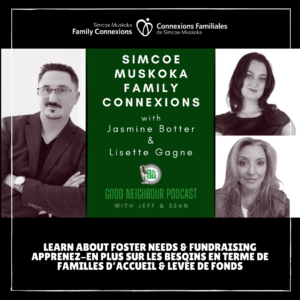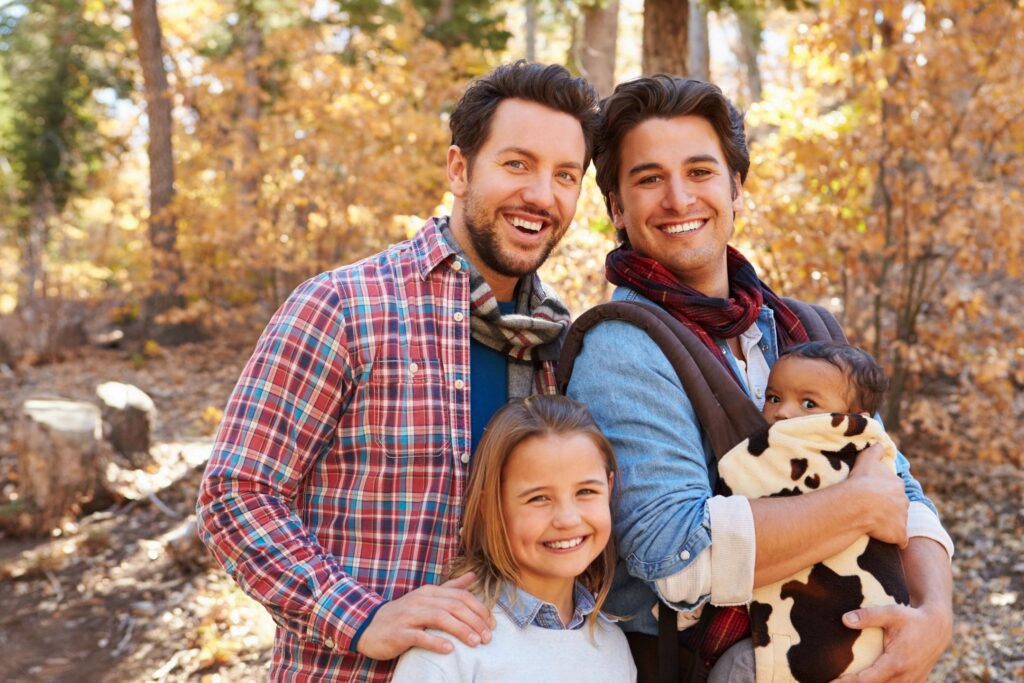We are committed to ensuring that children grow up in their culture, with an understanding of their personal identities and with their primary language. As such, we are actively recruiting foster caregivers from all identities and have identified specific needs for caregivers who are Francophone, Métis, Black and/or from the LGBT2SQ+ communities.
There are some basic requirements to be approved as a caregiver. The items below will be reviewed during the home study process.
- Physical capacity: bedroom space, windows, furniture
- Financially secure: stable income and insurance coverage
- Access to transportation: drives to appointments and family visits
- Background check: Child Welfare and Police
- Know and support agency policies on Anti-Oppression, Smoking, Discipline, Equality, and Diversity
- Medicals
- References
For First Nation, Inuit and Métis (FNIM) individuals interested in caring for children and youth in our community, they are offered the option to either foster for us or for Dnaagdawenmag Binnoojiiyag Child & Family Services (we will provide the contact information).
Their Alternative Care Program provides family-based care for First Nations, Inuit and Métis children/youth in need of support and out-of-home placement. The program is a continuum of services, including: customary care, kin service (out of care), kin in care, alternative care homes (community homes), and in-home support. Dnaagdawenmag Binnoojiiyag Child & Family Services acknowledges that it is the FNIM family’s right and responsibility to plan for their children and youth. As such, it is critical for children/youth to maintain their relationships with their biological parents and families. Alternative Caregivers join a circle of care which includes all parties (biological parents and families, communities and caregivers) working together, collaboratively.







Share the poster on your social pages!
3 days ago
Thank you to the Knights of Columbus for another year of generous donation of coats!
With their donation, we’ll be able to support many children and families in the community. Requests are already coming in and every donation makes a huge impact on the lives of our clients in need.
…
We are always in need of brand-new coats and snow pants or boots in any size (newborn to adult!). If you’re able to donate, it would mean so much to our clients in need. You can drop your donation off at our office nearest to you.
You can also support our agency financially or through in-kind donations: https://familyconnexions.ca/gi-donate/
– – – – – –
Merci aux Knights of Columbus pour une nouvelle année de généreux don de manteaux!
Grâce à leur don, nous pourrons soutenir de nombreux enfants et familles dans la communauté. Nous avons déjà des requêtes et chaque don a un grand impact sur les vies de nos clients dans le besoin.
Nous avons toujours besoin de manteaux et pantalons d’hivers neufs, ou bottes de toutes les tailles (enfants et adultes). Si vous pouvez faire un don, cela aura beaucoup d’impact pour nos clients dans le besoin. Vous pouvez déposer votre don à la succursale la plus proche de vous.
Si vous êtes intéressé à soutenir notre agence financièrement ou avec des dons en nature : https://familyconnexions.ca/gi-donate/
#giveback #donation #gift #nonprofit #coats #children #families #communities #youth #winter #holidays #charity #partner #sponsor #inkind #help #support #ontario #canada #simcoe #muskoka #pants #snowpants #boots #cold
Thank you to the Knights of Columbus for another year of generous donation of coats!
With their donation, we’ll be able to support many children and families in the community. Requests are already coming in and every donation makes a huge impact on the lives of our clients in need.
…
We are always in need of brand-new coats and snow pants or boots in any size (newborn to adult!). If you’re able to donate, it would mean so much to our clients in need. You can drop your donation off at our office nearest to you.
You can also support our agency financially or through in-kind donations: https://familyconnexions.ca/gi-donate/
– – – – – –
Merci aux Knights of Columbus pour une nouvelle année de généreux don de manteaux!
Grâce à leur don, nous pourrons soutenir de nombreux enfants et familles dans la communauté. Nous avons déjà des requêtes et chaque don a un grand impact sur les vies de nos clients dans le besoin.
Nous avons toujours besoin de manteaux et pantalons d’hivers neufs, ou bottes de toutes les tailles (enfants et adultes). Si vous pouvez faire un don, cela aura beaucoup d’impact pour nos clients dans le besoin. Vous pouvez déposer votre don à la succursale la plus proche de vous.
Si vous êtes intéressé à soutenir notre agence financièrement ou avec des dons en nature : https://familyconnexions.ca/gi-donate/
#giveback #donation #gift #nonprofit #coats #children #families #communities #youth #winter #holidays #charity #partner #sponsor #inkind #help #support #ontario #canada #simcoe #muskoka #pants #snowpants #boots #cold
4 days ago
Today, we recognize and celebrate Pronouns Day. It is important for all our clients and staff to feel safe and included.
Pronouns Day seeks to inform and educate about the proper use of personal pronouns. Personal pronouns are words that can be substituted for proper nouns like names. …Examples include he, she, they, etc. This day focuses on respecting an individual’s choices and celebrating multiple intersecting identities.
As we continue our efforts towards more equity and inclusion, we want to highlight folks regardless of their sex and be inclusive of all gender identities.
You can find more details here: https://pronounsday.org/resources. We also encourage you to find resources and reach out to community partners if you need any support.
– – – – – – – –
Aujourd'hui, nous reconnaissons et célébrons la Journée des Pronoms. Il est essentiel que nos clients et employé(e)s sentent inclus et en sécurité.
La journée des pronoms a pour but d’informer et éduquer sur la bonne utilisation des pronoms personnels. Les pronoms personnels sont des mots qui peuvent est remplacés pour des noms propres tels que des prénoms. Des exemples incluent il, elle, ils, elles, etc. Cette journée se concentre sur le respect du choix d’un individu et la célébration de plusieurs identités.
Tandis que nous continuons nos efforts vers plus d'équité et d'inclusion, nous voulons reconnaitre les personnes quel que soit leur sexe ou leur identité de genre.
Vous pouvez trouver plus de détails ici (lien en anglais uniquement) : https://pronounsday.org/resources. Nous vous encourageons également à trouver des ressources et contactez des partenaires communautaires si vous avez besoin de soutien.
#pronouns #they #them #he #she #genderidentity #gender #identity #lgbtq #2slbtq+ #queer #inclusion #visibility #equity #genderequality #love #loveislove #acceptance #tolerance #freedom #simcoe #muskoka #ontario #canada #equality #families #communities #community #family #respect
Today, we recognize and celebrate Pronouns Day. It is important for all our clients and staff to feel safe and included.
Pronouns Day seeks to inform and educate about the proper use of personal pronouns. Personal pronouns are words that can be substituted for proper nouns like names. …Examples include he, she, they, etc. This day focuses on respecting an individual’s choices and celebrating multiple intersecting identities.
As we continue our efforts towards more equity and inclusion, we want to highlight folks regardless of their sex and be inclusive of all gender identities.
You can find more details here: https://pronounsday.org/resources. We also encourage you to find resources and reach out to community partners if you need any support.
– – – – – – – –
Aujourd'hui, nous reconnaissons et célébrons la Journée des Pronoms. Il est essentiel que nos clients et employé(e)s sentent inclus et en sécurité.
La journée des pronoms a pour but d’informer et éduquer sur la bonne utilisation des pronoms personnels. Les pronoms personnels sont des mots qui peuvent est remplacés pour des noms propres tels que des prénoms. Des exemples incluent il, elle, ils, elles, etc. Cette journée se concentre sur le respect du choix d’un individu et la célébration de plusieurs identités.
Tandis que nous continuons nos efforts vers plus d'équité et d'inclusion, nous voulons reconnaitre les personnes quel que soit leur sexe ou leur identité de genre.
Vous pouvez trouver plus de détails ici (lien en anglais uniquement) : https://pronounsday.org/resources. Nous vous encourageons également à trouver des ressources et contactez des partenaires communautaires si vous avez besoin de soutien.
#pronouns #they #them #he #she #genderidentity #gender #identity #lgbtq #2slbtq+ #queer #inclusion #visibility #equity #genderequality #love #loveislove #acceptance #tolerance #freedom #simcoe #muskoka #ontario #canada #equality #families #communities #community #family #respect
5 days ago
A huge thank you to RBC and Felicia’s team in Barrie, in partnership with Kits for a Cause!
Thanks to them, we now have many winter kits including hats and mittens to give out to local kids and families in need. Winter kits are essential as we approach winter season and our Holiday …program, and we receive many requests from families.
Want to make a donation like RBC did? Visit the link in our bio to learn about our Ways to Give or visit https://familyconnexions.ca/education_program/!
All contributions, big and small, hold the potential to change a child’s life in many ways.
– – – – – – – – –
Un immense merci à RBC et à l’équipe de Felicia à Barrie, en partenariat avec Kits for a Cause !
Grâce à eux, nous disposons désormais de nombreux kits d'hiver, notamment des tuques et des mitaines, à distribuer aux enfants et aux familles dans le besoin de la région. Les kits d'hiver sont essentiels à l'approche de la saison hivernale et de notre programme des Fêtes, et nous recevons de nombreuses demandes de familles.
Vous voulez faire un don comme RBC l’a fait ? Visitez le lien dans notre bio pour en savoir plus sur nos façons de donner ou visitez https://familyconnexions.ca/education_program/ !
Toutes les contributions, grandes et petites, ont le potentiel de changer la vie d’un enfant de plusieurs manières.
#donation #donate #giveback #charity #nonprofit #simcoe #muskoka #ontario #canada #child #children #youth #families #family #communities #community #care #support #partnership #thankyou #thankful #rbc #barrie #kitsforacause #kits #winter #clothes #hats #gloves #mittens
A huge thank you to RBC and Felicia’s team in Barrie, in partnership with Kits for a Cause!
Thanks to them, we now have many winter kits including hats and mittens to give out to local kids and families in need. Winter kits are essential as we approach winter season and our Holiday …program, and we receive many requests from families.
Want to make a donation like RBC did? Visit the link in our bio to learn about our Ways to Give or visit https://familyconnexions.ca/education_program/!
All contributions, big and small, hold the potential to change a child’s life in many ways.
– – – – – – – – –
Un immense merci à RBC et à l’équipe de Felicia à Barrie, en partenariat avec Kits for a Cause !
Grâce à eux, nous disposons désormais de nombreux kits d'hiver, notamment des tuques et des mitaines, à distribuer aux enfants et aux familles dans le besoin de la région. Les kits d'hiver sont essentiels à l'approche de la saison hivernale et de notre programme des Fêtes, et nous recevons de nombreuses demandes de familles.
Vous voulez faire un don comme RBC l’a fait ? Visitez le lien dans notre bio pour en savoir plus sur nos façons de donner ou visitez https://familyconnexions.ca/education_program/ !
Toutes les contributions, grandes et petites, ont le potentiel de changer la vie d’un enfant de plusieurs manières.
#donation #donate #giveback #charity #nonprofit #simcoe #muskoka #ontario #canada #child #children #youth #families #family #communities #community #care #support #partnership #thankyou #thankful #rbc #barrie #kitsforacause #kits #winter #clothes #hats #gloves #mittens
6 days ago
Join us at the Accessible Halloween Village on October 27th!
The event will take place in Barrie from 2:30-4:30PM and is free for everyone.
Share the word and register at https://oatleyvigmond.com/event/accessible-halloween-village-2024/
– – – – – –
…Rejoignez-nous au Village Accessible Halloween le 27 octobre!
L’événement aura lieu à Barrie de 14 h 30 à 16 h 30 et est gratuit pour tout le monde.
Partagez l’information et inscrivez-vous sur https://oatleyvigmond.com/event/accessible-halloween-village-2024/
#accessibility #halloween #inclusion #barrie #simcoe #muskoka #family #families #community #communities #youth #child #children #village #kids #parents #trickortreat #treats #fall #spooky
Join us at the Accessible Halloween Village on October 27th!
The event will take place in Barrie from 2:30-4:30PM and is free for everyone.
Share the word and register at https://oatleyvigmond.com/event/accessible-halloween-village-2024/
– – – – – –
…Rejoignez-nous au Village Accessible Halloween le 27 octobre!
L’événement aura lieu à Barrie de 14 h 30 à 16 h 30 et est gratuit pour tout le monde.
Partagez l’information et inscrivez-vous sur https://oatleyvigmond.com/event/accessible-halloween-village-2024/
#accessibility #halloween #inclusion #barrie #simcoe #muskoka #family #families #community #communities #youth #child #children #village #kids #parents #trickortreat #treats #fall #spooky
1 weeks ago
October is Disability Employment Awareness Month.
Our goal is to showcase our commitment to inclusive employment while helping to break down the barriers that exist for people experiencing disability.
If you have any request for accommodation, visit our website.
For more …information on the awareness month, please visit the Canadian Association for Supported Employment website: https://supportedemployment.ca/initiatives/disability-employment-awareness-month/
– – – – – – – –
Octobre est le Mois de la sensibilisation à l'emploi des personnes en situation de handicap.
Notre but est de montrer notre engagement pour un lieu de travail inclusif, tout en aidant à briser les barrières qui existent pour les personnes qui sont en situation de handicap.
Pour toute demande d’accommodation, visitez notre site internet.
Pour plus d’information sur ce mois de sensibilisation, visitez le site de l’Association canadienne de soutien à l’emploi : https://supportedemployment.ca/fr/initiatives/disability-employment-awareness-month/
#DEAM2024 #disability #inclusion #equality #fair #handicap #employment #hr #hiring #inclusiveworkplace #workplace #childwelfare #protection #families #employees #communities #children #youth #family #canada #ontario #simcoe #muskoka #community #care
October is Disability Employment Awareness Month.
Our goal is to showcase our commitment to inclusive employment while helping to break down the barriers that exist for people experiencing disability.
If you have any request for accommodation, visit our website.
For more …information on the awareness month, please visit the Canadian Association for Supported Employment website: https://supportedemployment.ca/initiatives/disability-employment-awareness-month/
– – – – – – – –
Octobre est le Mois de la sensibilisation à l'emploi des personnes en situation de handicap.
Notre but est de montrer notre engagement pour un lieu de travail inclusif, tout en aidant à briser les barrières qui existent pour les personnes qui sont en situation de handicap.
Pour toute demande d’accommodation, visitez notre site internet.
Pour plus d’information sur ce mois de sensibilisation, visitez le site de l’Association canadienne de soutien à l’emploi : https://supportedemployment.ca/fr/initiatives/disability-employment-awareness-month/
#DEAM2024 #disability #inclusion #equality #fair #handicap #employment #hr #hiring #inclusiveworkplace #workplace #childwelfare #protection #families #employees #communities #children #youth #family #canada #ontario #simcoe #muskoka #community #care
1 weeks ago
Each year is another opportunity to thank all of the families who play a critical role in their communities and make a difference in the life of a family by providing temporary care to a child or youth.
Foster caregivers provide a stable and caring home and facilitate pathways to lifelong …connections with family and community.
In most situations, children placed in foster care are reunified with their families. In other situations, foster care can open new doors to safety, permanency, and well-being for children whose parents are unable to meet their needs.
The need for foster caregivers is ongoing. If you or anyone you know is interested, or have any questions, please reach out to us. We also encourage you to visit our website and familiarize yourself with our new foster recruitment videos!
– – – – – – – –
Chaque année est une nouvelle opportunité de remercier toutes les familles qui jouent un rôle essentiel dans leurs communautés et font la différence dans la vie d’une famille en offrant une protection temporaire pour un enfant ou jeune.
Les familles d’accueil offrent un foyer stable et accueillant, et aident à créer des connexions sur le long terme avec la famille et la communauté.
Nous reconnaissons que les enfants et jeunes agissent mieux lorsqu’ils sont placés dans des maisons qui reflètent la diversité de leurs communautés, leur race, ethnicité, foi, orientation sexuelle, identité de genre et/ou expression de genre.
Dans la plupart des situations, les enfants placés dans des familles d’accueil sont réunifiés avec leurs familles. Dans d’autres situations, le placement d’accueil peut ouvrir de nouvelles portes pour la sécurité, la permanence, et le bien-être pour les enfants dont les parents ne peuvent pas répondre à leurs besoins.
Le besoin de familles d’accueil est constant. Si vous ou quelqu’un que vous connaissez est intéressé, ou pour toute question, contactez-nous. Nous vous encourageons également à visiter notre site internet pour vous familiariser avec nos nouvelles vidéos de recrutement de familles d’accueil!
#foster #fostering #fosterappreciationweek #appreciation #care #childcare #home #fosterhome #families #communities #fosterweek
Each year is another opportunity to thank all of the families who play a critical role in their communities and make a difference in the life of a family by providing temporary care to a child or youth.
Foster caregivers provide a stable and caring home and facilitate pathways to lifelong …connections with family and community.
In most situations, children placed in foster care are reunified with their families. In other situations, foster care can open new doors to safety, permanency, and well-being for children whose parents are unable to meet their needs.
The need for foster caregivers is ongoing. If you or anyone you know is interested, or have any questions, please reach out to us. We also encourage you to visit our website and familiarize yourself with our new foster recruitment videos!
– – – – – – – –
Chaque année est une nouvelle opportunité de remercier toutes les familles qui jouent un rôle essentiel dans leurs communautés et font la différence dans la vie d’une famille en offrant une protection temporaire pour un enfant ou jeune.
Les familles d’accueil offrent un foyer stable et accueillant, et aident à créer des connexions sur le long terme avec la famille et la communauté.
Nous reconnaissons que les enfants et jeunes agissent mieux lorsqu’ils sont placés dans des maisons qui reflètent la diversité de leurs communautés, leur race, ethnicité, foi, orientation sexuelle, identité de genre et/ou expression de genre.
Dans la plupart des situations, les enfants placés dans des familles d’accueil sont réunifiés avec leurs familles. Dans d’autres situations, le placement d’accueil peut ouvrir de nouvelles portes pour la sécurité, la permanence, et le bien-être pour les enfants dont les parents ne peuvent pas répondre à leurs besoins.
Le besoin de familles d’accueil est constant. Si vous ou quelqu’un que vous connaissez est intéressé, ou pour toute question, contactez-nous. Nous vous encourageons également à visiter notre site internet pour vous familiariser avec nos nouvelles vidéos de recrutement de familles d’accueil!
#foster #fostering #fosterappreciationweek #appreciation #care #childcare #home #fosterhome #families #communities #fosterweek
2 weeks ago
Today, we recognize and celebrate Coming Out day.
This day aims to celebrate and normalize coming out. Sharing our authentic selves with others is not always safe or easy, and it is not a one-day event — but when possible, it can be an extraordinarily powerful key to breaking down the …barriers we face as 2SLGBTQIA+ people.
As we continue our efforts towards more equity and inclusion, we want to highlight folks regardless of their sex and be inclusive of all gender identities.
We encourage you to find resources and reach out to community partners if you need any support.
– – – – – – – –
Aujourd'hui, nous reconnaissons et célébrons la Journée du Coming Out.
Cette journée a pour but de célébrer et normaliser le coming out. Partager qui nous sommes vraiment avec les autres n’est pas toujours facile, et n’est pas sur une seule journée – mais lorsque c’est possible, cela peut être une façon très puissante pour briser les barrières auxquelles les personnes 2SLGBTQIA+ font face.
Tandis que nous continuons nos efforts vers plus d'équité et d'inclusion, nous voulons reconnaitre les personnes quel que soit leur sexe ou leur identité de genre.
Nous vous encourageons à trouver des ressources et contactez des partenaires communautaires si vous avez besoin de soutien.
#comingout #genderidentity #gender #identity #lgbtq #2slbtq+ #queer #inclusion #visibility #equity #genderequality #love #loveislove #acceptance #tolerance #freedom #simcoe #canada #ontario #muskoka #families #communities #community #family #support #help #equality #lgbtq+ #2slgbtqia+
Today, we recognize and celebrate Coming Out day.
This day aims to celebrate and normalize coming out. Sharing our authentic selves with others is not always safe or easy, and it is not a one-day event — but when possible, it can be an extraordinarily powerful key to breaking down the …barriers we face as 2SLGBTQIA+ people.
As we continue our efforts towards more equity and inclusion, we want to highlight folks regardless of their sex and be inclusive of all gender identities.
We encourage you to find resources and reach out to community partners if you need any support.
– – – – – – – –
Aujourd'hui, nous reconnaissons et célébrons la Journée du Coming Out.
Cette journée a pour but de célébrer et normaliser le coming out. Partager qui nous sommes vraiment avec les autres n’est pas toujours facile, et n’est pas sur une seule journée – mais lorsque c’est possible, cela peut être une façon très puissante pour briser les barrières auxquelles les personnes 2SLGBTQIA+ font face.
Tandis que nous continuons nos efforts vers plus d'équité et d'inclusion, nous voulons reconnaitre les personnes quel que soit leur sexe ou leur identité de genre.
Nous vous encourageons à trouver des ressources et contactez des partenaires communautaires si vous avez besoin de soutien.
#comingout #genderidentity #gender #identity #lgbtq #2slbtq+ #queer #inclusion #visibility #equity #genderequality #love #loveislove #acceptance #tolerance #freedom #simcoe #canada #ontario #muskoka #families #communities #community #family #support #help #equality #lgbtq+ #2slgbtqia+
2 weeks ago
We’re hiring for multiple Volunteer Board Member positions.
Check the details on our website: https://familyconnexions.ca/current-jobs/
We welcome applicants from equity-deserving communities. While we encourage all interested persons to apply, as a skills-based board, we are …particularly interested in community members who work or live in the District of Muskoka and have lived or professional experience in the following areas:
– Francophone, bilingual in French/English
– Children Services
– Law
– Finance, fundraising
Share this post if you know anyone in your network who may want to apply!
– – – – –
Nous embauchons pour plusieurs postes de Membres du conseil d'administration Bénévoles.
Visitez notre site internet pour voir les détails du poste: https://familyconnexions.ca/current-jobs/
Les candidats issus de communautés méritant l’équité sont les bienvenus. Bien que nous encouragions toutes les personnes intéressées à postuler, en tant que Conseil d’Administration basé sur les compétences, nous sommes particulièrement intéressés à trouver des membres de la communauté qui travaillent ou vivent dans le district de Muskoka et qui ont vécu ou ont une expérience professionnelle dans les domaines suivants:
– Francophone, bilingue français/anglais
– Services à l'enfance
– Services juridiques
– Finance, collecte de fonds
Partagez avec votre réseau si vous pensez connaitre des personnes qui souhaitent appliquer!
#hiring #embauche #applytoday #muskoka #ontario #simcoe #childwelfare #hr #humanresources #board #boardmember #volunteer #benevole #membre #conseildadministration
We’re hiring for multiple Volunteer Board Member positions.
Check the details on our website: https://familyconnexions.ca/current-jobs/
We welcome applicants from equity-deserving communities. While we encourage all interested persons to apply, as a skills-based board, we are …particularly interested in community members who work or live in the District of Muskoka and have lived or professional experience in the following areas:
– Francophone, bilingual in French/English
– Children Services
– Law
– Finance, fundraising
Share this post if you know anyone in your network who may want to apply!
– – – – –
Nous embauchons pour plusieurs postes de Membres du conseil d'administration Bénévoles.
Visitez notre site internet pour voir les détails du poste: https://familyconnexions.ca/current-jobs/
Les candidats issus de communautés méritant l’équité sont les bienvenus. Bien que nous encouragions toutes les personnes intéressées à postuler, en tant que Conseil d’Administration basé sur les compétences, nous sommes particulièrement intéressés à trouver des membres de la communauté qui travaillent ou vivent dans le district de Muskoka et qui ont vécu ou ont une expérience professionnelle dans les domaines suivants:
– Francophone, bilingue français/anglais
– Services à l'enfance
– Services juridiques
– Finance, collecte de fonds
Partagez avec votre réseau si vous pensez connaitre des personnes qui souhaitent appliquer!
#hiring #embauche #applytoday #muskoka #ontario #simcoe #childwelfare #hr #humanresources #board #boardmember #volunteer #benevole #membre #conseildadministration
3 weeks ago
We are so grateful to Giant Tiger, Cundles Road E in Barrie for helping to spread the word about our #RideForRefuge event and provide snacks and supplies as a Goods & Services Sponsor!
Interested in becoming a sponsor? It’s not too late! Contact us!
Our ability to support …local victims of human trafficking is made possible by the support of our community. We couldn’t do it without you!
To learn more, register, or donate to our Ride for Refuge campaign, visit the link in our bio.
– – – – – – – –
Nous sommes très reconnaissants envers Giant Tiger, Cundles Road E à Barrie d'avoir aidé à faire connaître notre événement #RideForRefuge et d’offrir des snacks et fournitures en tant que parrain Biens & Services!
Intéressé pour devenir un sponsor? Ce n’est pas trop tard! Contactez-nous!
Notre capacité à soutenir les victimes locales de la traite des personnes est rendue possible grâce au soutien de notre communauté. Nous ne pourrions pas le faire sans vous !
Pour en savoir plus, vous inscrire ou faire un don à notre campagne Ride for Refuge, visitez le lien dans notre bio.
#ride24 #rideforrefuge #charity #nonprofit #barrie #simcoe #muskoka #canada #ontario #humantrafficking #fundraising #event #children #child #youth #community #communities #families #family #partners #ride #bike #walk
We are so grateful to Giant Tiger, Cundles Road E in Barrie for helping to spread the word about our #RideForRefuge event and provide snacks and supplies as a Goods & Services Sponsor!
Interested in becoming a sponsor? It’s not too late! Contact us!
Our ability to support …local victims of human trafficking is made possible by the support of our community. We couldn’t do it without you!
To learn more, register, or donate to our Ride for Refuge campaign, visit the link in our bio.
– – – – – – – –
Nous sommes très reconnaissants envers Giant Tiger, Cundles Road E à Barrie d'avoir aidé à faire connaître notre événement #RideForRefuge et d’offrir des snacks et fournitures en tant que parrain Biens & Services!
Intéressé pour devenir un sponsor? Ce n’est pas trop tard! Contactez-nous!
Notre capacité à soutenir les victimes locales de la traite des personnes est rendue possible grâce au soutien de notre communauté. Nous ne pourrions pas le faire sans vous !
Pour en savoir plus, vous inscrire ou faire un don à notre campagne Ride for Refuge, visitez le lien dans notre bio.
#ride24 #rideforrefuge #charity #nonprofit #barrie #simcoe #muskoka #canada #ontario #humantrafficking #fundraising #event #children #child #youth #community #communities #families #family #partners #ride #bike #walk